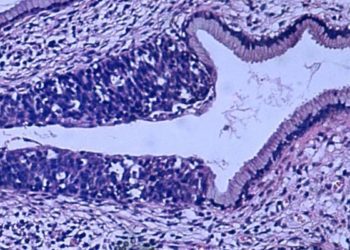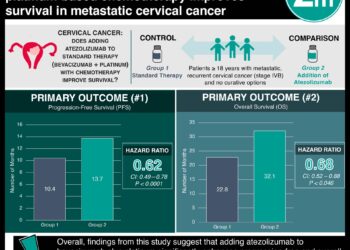#VisualAbstract: Atezolizumab-bevacizumab treatment increases survival in unresectable hepatocellular carcinoma
1. Combination treatment of atezolizumab and bevacizumab was shown to significantly increase overall survival and progression-free survival outcomes in patients with advanced unresectable hepatocellular carcinoma.
2. Patients treated with the combinatorial treatment of atezolizumab and bevacizumab were shown to experience serious toxic side effects.
Evidence Rating Level: 1 (Excellent)
Hepatocellular carcinoma is a leading cause of cancer-related death with most patients presenting with unresectable disease. First-line systemic treatment consists of sorafenib, which is a multikinase inhibitor. Currently, several immunotherapies targeting the PD-L1-PD-1 pathway are becoming of interest for patients with hepatocellular carcinoma such as atezolizumab and bevacizumab. This study determined the safety and efficacy of a combinatorial atezolizumab-bevacizumab treatment in patients with unresectable hepatocellular carcinoma. The participants were randomized to receive atezolizumab-bevacizumab or sorafenib treatment. The study determined the patients in the atezolizumab-bevacizumab group had a significantly higher overall survival and progression-free survival compared to the patients in the sorafenib group. However, patients in the treatment group did experience serious toxic side effects such as hypertension and pruritis, which were consistent with the known safety profiles of atezolizumab and bevacizumab. This randomized trial was limited by the study design as an open-label study. The study design resulted in the participants and the researchers knowing the treatment classification potentially introducing a bias in patient-related outcomes such as adverse effects and quality of life measurements. Another limitation of the study was the study population only included patients with preserved liver function. Nonetheless, this study was strengthened by the long-term patient follow-up and matched patient characteristics between both groups. For physicians, these findings highlighted an alternative treatment for patients with advanced unresectable hepatocellular carcinoma.
Click to read the study in NEJM
©2020 2 Minute Medicine, Inc. All rights reserved. No works may be reproduced without expressed written consent from 2 Minute Medicine, Inc. Inquire about licensing here. No article should be construed as medical advice and is not intended as such by the authors or by 2 Minute Medicine, Inc.






